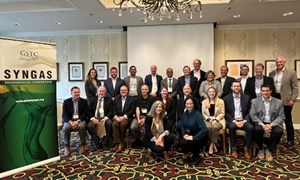Global Syngas Technologies Council convened to address global syngas market
Catherine Watkins, Chief Financial Officer, Gulf Energy Information
Situated in the beautiful natural surroundings of Colorado Springs with the backdrop of the Rocky Mountains, the Global Syngas Technologies Council (GSTC) convened for their Spring board meeting at the Broadmoor Resort and Hotel. GSTC is an international association of companies involved in the technology supply for, and the execution and technical servicing of, syngas production and chemical production from syngas. Members play a key role in producing and converting syngas efficiently, cleanly and safely in the chemical, refining, energy and waste management industries. Members range from operators such as BASF, bp, Celanese, Linde and Reliance; to engineering, procurement and construction (EPC) firms such as Burns & McDonnell, KP Engineering and S&B Engineers; as well as technology providers such as ABB and Topsoe.

The day started with several new member spotlights with presentations by thyssenkrupp Uhde’s Karsten Radtke, Kiewit’s Brian Deason and Modular Plant Solutions’ Russell Hillenburg. The presentations were interesting both by their diversity and the openness of the dialog. Radtke’s presentation touched on thyssenkrupp Uhde’s substantial experience of enabling technologies (such as CO2 capture, blue hydrogen, blue ammonia, blue methanol, among others) and green technologies (e.g., green hydrogen, green ammonia, green methanol, methanol-to-X, BioTfuel, among others). He also presented the recently launched BioTfuel project, a JV with Axens, for the global commercialization of green sustainable aviation fuel (SAF) and their Carbon2Chem project. He left the group curious to hear their announcement regarding green gasoline applications, which will be unveiled in Q3 of this year.
Meanwhile, Brian Deason, Vice President of Industrial Markets and Strategy, Waste-to-Energy, Kiewit, discussed his organization’s development as an EPC, and the creation of their newest Industrial and Water Engineering division and Waste-to-Energy segment. He also presented the advantages of being employee-owned and having 80%–90% of their work self-performed, with nearly 26,000 employees and over 55 MM direct-hire labor hours per year. Deason, along with his colleagues Anindra Mazumdar and Bob Brown, also provided an overview of their 40 hydrogen projects, including six from waste energy that are in the front-end engineering design (FEED) stage. Deason also touched on Kiewit’s carbon capture task force which developed out of their post-combustion team that had serviced the largest post-combustion operating unit in the country. Kiewit’s clean renewable energy solutions include chemical and thermal process technologies, such as torrefaction, gasification and pyrolysis. Process feedstocks include municipal solid waste, agricultural biomass, food waste or other potential waste materials, and could produce syngas, renewable natural gas (RNG), biogas, hydrogen, black pellets or other renewable fuels.
Finally, Russ Hillenburg, Modular Plant Solutions (MPS), described the history and progression of MPS to its current focus on the introduction of their Methanol-to-Go (MeOH-To-Go®) process as a solution for small-scale modular methanol plant technology—the technology is designed for field operations anywhere with versatile and standardized production. The company’s modularized plant design allows for savings on upfront capital costs, making assembly and transportation quicker and easier relative to world-scale plant needs and is easily transportable to remote locations and can be moved, if needed. This modular design also reduces the risks common in field construction. These plants enable users to produce their own methanol output from associated, stranded or pipeline gas. The plant is designed to be self-sufficient with respect to utilities so it can be operated as a stand-alone facility. MPS sees this solution as a benefit as the market grows, and the technology can work with many different technologies including electrolyzers and gasoline.
The GSTC board meeting also included discussions on the association’s goals, member benefits and planning for the success of the Annual Meeting in San Diego in October (https://globalsyngas.org/). All told, this meeting provided interesting content from engaging, passionate and friendly people in a beautiful environment!
Related News
Related News

- Credit Agricole says it will not fund two major LNG projects
- Aramco awards $7.7-B contracts to add 1.5 Bscfd of raw gas to Fadhili Gas Plant
- Japan's JERA suspends output at 4 gas-fired power plants to secure LNG stocks
- TotalEnergies: Papua LNG project requires 'more work' to reach final investment decision
- Saudi Aramco, UAE's ADNOC in talks to invest in U.S. LNG projects
- Technip Energies awarded a major LNG contract for the North Field South Project by QatarEnergy
- Shell publishes Energy Transition Strategy 2024
- QatarEnergy to charter 19 new LNG vessels expanding fleet further
- Aramco awards $7.7-B contracts to add 1.5 Bscfd of raw gas to Fadhili Gas Plant
- Mabanaft announces successful acquisition of WESTFA Energy GmbH



Comments